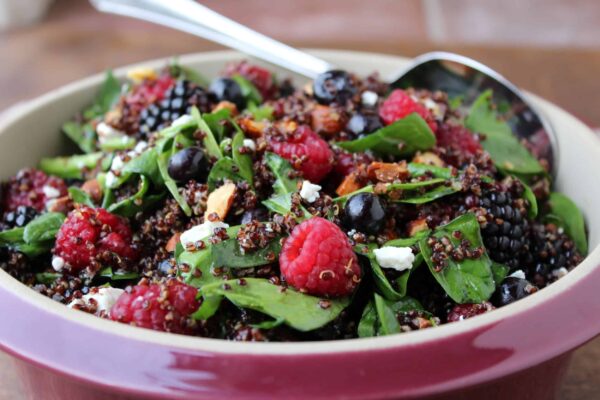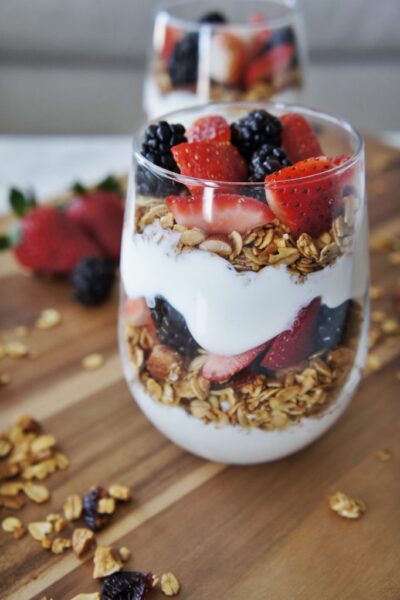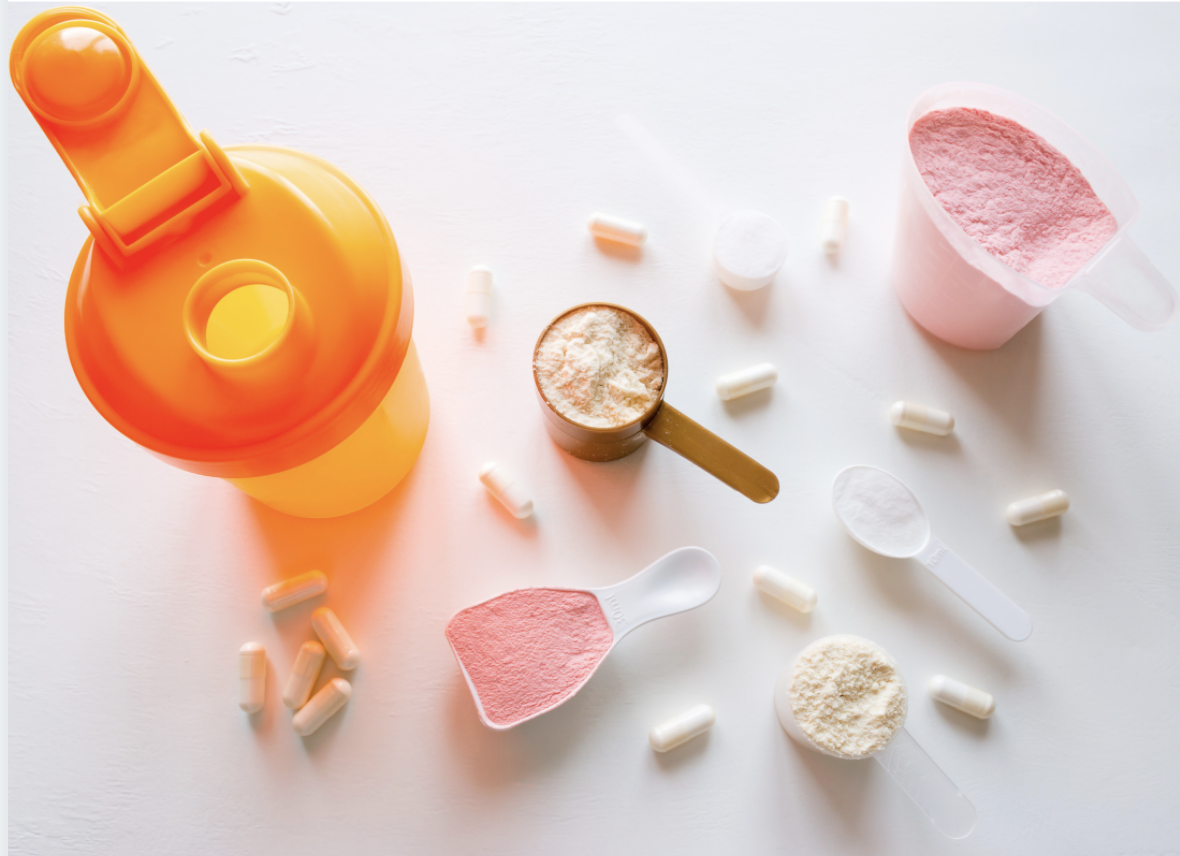
Summer is the perfect time to enjoy fresh, vibrant, and nutritious meals that are both delicious and healthy. The Optimized Humans app offers a plethora of recipes designed to keep you energized and satisfied during the hot months. Here are the top 10 healthy summer recipes you can find in our app, perfect for meals and snacks that celebrate the best of the season.

1. Berry Quinoa Salad
Ingredients:
- 1 cup quinoa
- 2 cups water
- 1 cup fresh strawberries, sliced
- 1 cup fresh blueberries
- 1/4 cup chopped fresh mint
- 1/4 cup crumbled feta cheese
- 2 tbsp olive oil
- 1 tbsp balsamic vinegar
- Salt and pepper to taste
Instructions:
- Rinse quinoa under cold water. In a saucepan, bring quinoa and water to a boil. Reduce heat, cover, and simmer for 15 minutes until water is absorbed.
- In a large bowl, combine cooked quinoa, strawberries, blueberries, mint, and feta.
- In a small bowl, whisk together olive oil, balsamic vinegar, salt, and pepper. Pour over salad and toss to combine.

2. Grilled Chicken and Veggie Skewers
Ingredients:
- 2 boneless, skinless chicken breasts, cut into chunks
- 1 red bell pepper, cut into chunks
- 1 yellow bell pepper, cut into chunks
- 1 zucchini, sliced
- 1 red onion, cut into chunks
- 2 tbsp olive oil
- 2 tbsp lemon juice
- 1 tsp dried oregano
- Salt and pepper to taste
Instructions:
- Preheat grill to medium-high heat.
- In a bowl, mix olive oil, lemon juice, oregano, salt, and pepper. Add chicken and veggies, tossing to coat.
- Thread chicken and veggies onto skewers.
- Grill skewers for 10-12 minutes, turning occasionally, until chicken is cooked through and veggies are tender.

3. Watermelon and Feta Salad
Ingredients:
- 4 cups cubed watermelon
- 1/2 cup crumbled feta cheese
- 1/4 cup fresh mint leaves, chopped
- 2 tbsp olive oil
- 1 tbsp balsamic glaze
- Salt and pepper to taste
Instructions:
- In a large bowl, combine watermelon, feta, and mint.
- Drizzle with olive oil and balsamic glaze.
- Season with salt and pepper and toss gently to combine.

4. Avocado and Black Bean Wraps
Ingredients:
- 1 avocado, sliced
- 1 can black beans, drained and rinsed
- 1 cup shredded lettuce
- 1/2 cup cherry tomatoes, halved
- 1/4 cup red onion, thinly sliced
- 4 whole wheat tortillas
- 2 tbsp lime juice
- 2 tbsp chopped cilantro
- Salt and pepper to taste
Instructions:
- In a bowl, mix black beans, lime juice, cilantro, salt, and pepper.
- Lay tortillas flat and layer with lettuce, black bean mixture, avocado, tomatoes, and red onion.
- Roll up tortillas and serve immediately.

5. Greek Yogurt and Berry Parfait
Ingredients:
- 2 cups Greek yogurt
- 1 cup granola
- 1 cup mixed fresh berries (strawberries, blueberries, raspberries)
- 2 tbsp honey
Instructions:
- In a glass or bowl, layer Greek yogurt, granola, and berries.
- Drizzle with honey.
- Repeat layers and serve immediately.
Conclusion
These top 5 healthy summer recipes from the Optimized Humans app are perfect for enjoying the vibrant flavors of the season while keeping your nutrition on track. Download the Optimized Humans app to access these recipes and many more, along with personalized nutrition plans and expert advice to help you stay healthy and fit all summer long. Enjoy the deliciousness of summer and fuel your body with the best nutrients nature has to offer!

As we age, our bodies undergo a complex interplay of processes that contribute to the overall aging phenomenon. Scientists have identified twelve key mechanisms that play a role in this intricate process. Understanding these mechanisms and adopting healthy lifestyle strategies can potentially mitigate their effects and promote healthier aging.
Let’s dive deeper into each mechanism of aging and explore some healthy strategies that might help combat these issues:
- Genomic Instability: This refers to damage in DNA, which can lead to mutations and cellular dysfunction. To mitigate this, a healthy lifestyle involving a balanced diet, regular exercise, and minimizing exposure to harmful environmental factors like radiation and toxins can be beneficial. Antioxidants found in fruits and vegetables might help reduce DNA damage by neutralizing free radicals.
- Telomere Attrition: Protecting telomeres is crucial. Lifestyle habits that support telomere health include managing stress through meditation or mindfulness, regular exercise, and consuming a diet rich in antioxidants and omega-3 fatty acids. Some studies suggest that activities like yoga and meditation may positively impact telomere length.
- Epigenetic Alterations: Maintaining a healthy lifestyle with proper nutrition, exercise, and stress management can positively influence gene expression. Additionally, some research suggests that certain foods, like those rich in folate and other methyl-donating compounds, might help maintain healthy epigenetic patterns.
- Loss of Proteostasis: Regular exercise and a balanced diet can support the body’s ability to maintain proper protein structure and function. Including protein-rich foods, maintaining hydration, and managing chronic inflammation can also aid in proteostasis.
- Deregulated Nutrient Sensing: Caloric restriction and intermittent fasting have been linked to improved nutrient sensing pathways. Consuming a balanced diet and maintaining a healthy weight can also help regulate nutrient sensing mechanisms.
- Mitochondrial Dysfunction: Regular exercise has been shown to improve mitochondrial function. Additionally, consuming a diet rich in antioxidants and nutrients that support mitochondrial health (such as coenzyme Q10, found in nuts and seeds) might be beneficial.
- Cellular Senescence: While currently, there’s no direct way to eliminate senescent cells, maintaining a healthy lifestyle can delay their accumulation. Regular exercise and consuming anti-inflammatory foods may help mitigate cellular senescence.
- Stem Cell Exhaustion: Exercise has been shown to increase the number and activity of stem cells. Additionally, certain dietary components, like resveratrol found in red grapes, might support stem cell health.
- Altered Intercellular Communication: Consuming a diet rich in anti-inflammatory foods and maintaining a healthy weight can support proper intercellular communication. Regular exercise has also been linked to improved cell signaling.
- Dysregulated Nutrient Sensing: Similar to deregulated nutrient sensing, strategies like caloric restriction and intermittent fasting may help regulate nutrient sensing pathways. Consuming a balanced diet with adequate nutrients also supports healthy nutrient sensing.
- Accumulation of Senescent Cells: Research is ongoing to find ways to eliminate senescent cells. While direct methods are still developing, lifestyle habits like regular exercise and a healthy diet might help delay the accumulation of these cells.
Conclusion
While these strategies show promise in supporting healthy aging, it’s important to remember that aging is a complex process. Consulting healthcare professionals before making significant lifestyle changes is advisable. By understanding these mechanisms and adopting healthy habits, we can potentially positively influence the aging process and lead healthier lives.
Remember, aging is a natural process, but adopting a healthy lifestyle can significantly impact how we age and the quality of our later years.
Embarking on a journey towards optimal health involves more than just a one-size-fits-all approach. Different life stages bring unique nutritional needs, and supplements can play a vital role in supporting overall well-being. In this blog, we explore a lifelong guide to supplements, tailored for every stage of life.
- Childhood: Laying the Foundation
During childhood, the emphasis is on growth, development, and building a strong foundation for a healthy future. Key supplements include:
– Multivitamins: Ensure a comprehensive intake of essential vitamins and minerals crucial for growth.
– Vitamin D and Calcium: Support bone development and overall skeletal health.
– Omega-3 Fatty Acids: Aid in cognitive development and support brain health.
- Adolescence: Navigating Growth Spurts and Hormonal Changes
As adolescents undergo rapid growth and hormonal changes, their nutritional needs evolve. Supplements to consider include:
– Iron: Particularly important for girls, as iron needs increase with the onset of menstruation.
– B-Complex Vitamins: Support energy metabolism during periods of increased activity.
– Vitamin C: Enhance iron absorption and support immune function.
- Young Adulthood: Balancing Work, Lifestyle, and Health
During the hustle and bustle of young adulthood, maintaining a balance between work, lifestyle, and health becomes crucial. Key supplements include:
– Protein Powders: Support muscle maintenance and repair, especially for those engaging in regular physical activity.
– Vitamin B12: Essential for energy metabolism, particularly for those following plant-based diets.
– Omega-3 Fatty Acids: Continue to support heart health and cognitive function.
- Middle Age: Prioritizing Heart and Bone Health
As individuals enter middle age, priorities shift towards maintaining heart and bone health. Relevant supplements include:
– Coenzyme Q10 (CoQ10): Supports heart health and cellular energy production.
– Vitamin K2: Works in conjunction with vitamin D and calcium to support bone health.
– Magnesium: Aids in muscle function and supports cardiovascular health.
- Senior Years: Supporting Bone Density and Cognitive Health
In the senior years, focus turns to maintaining bone density and cognitive function. Essential supplements include:
– Calcium with Vitamin D: Crucial for bone health and preventing osteoporosis.
– Vitamin B12: Supports cognitive function and energy metabolism, addressing potential deficiencies common in older adults.
– Omega-3 Fatty Acids: Continue to support cognitive health and may contribute to cardiovascular health.
Guiding Principles for a Lifelong Supplement Strategy:
- Individualized Approach: Tailor supplement choices based on individual health needs, dietary preferences, and lifestyle factors.
- Regular Health Check-ups: Periodic health check-ups can help identify potential deficiencies or changing health needs, informing supplement choices.
- Consultation with Healthcare Professionals: Seek guidance from healthcare professionals or registered dietitians to ensure supplement choices align with individual health goals and potential interactions with medications.
Conclusion: A Holistic Approach to Lifelong Well-being
A lifelong guide to supplements is not a rigid roadmap but a flexible framework that adapts to the changing needs of each life stage. By embracing a holistic approach to well-being, rooted in informed supplement choices, individuals can navigate the journey of life with vitality, resilience, and the support needed to thrive at every stage. Remember, the key is not just the destination but the well-nourished journey along the way.
Branched-chain amino acids, or BCAAs, are a special group of amino acids. They are some of the most proven athletic supplements you can take. The benefits of BCAAs include less muscle fatigue, faster recovery, higher levels of other amino acids, and better protein absorption. Not getting enough of them can cause muscle loss.

